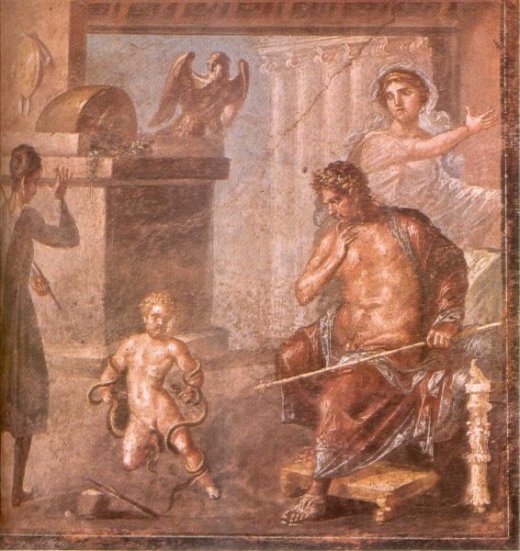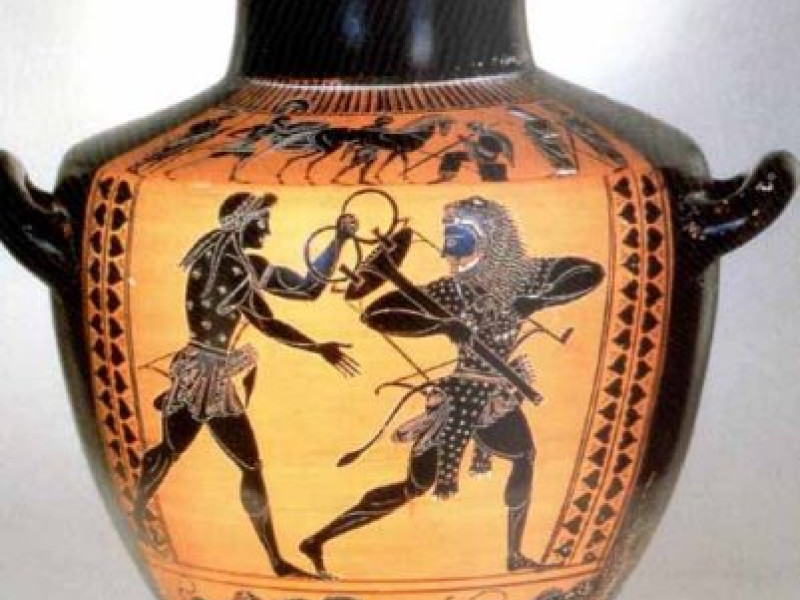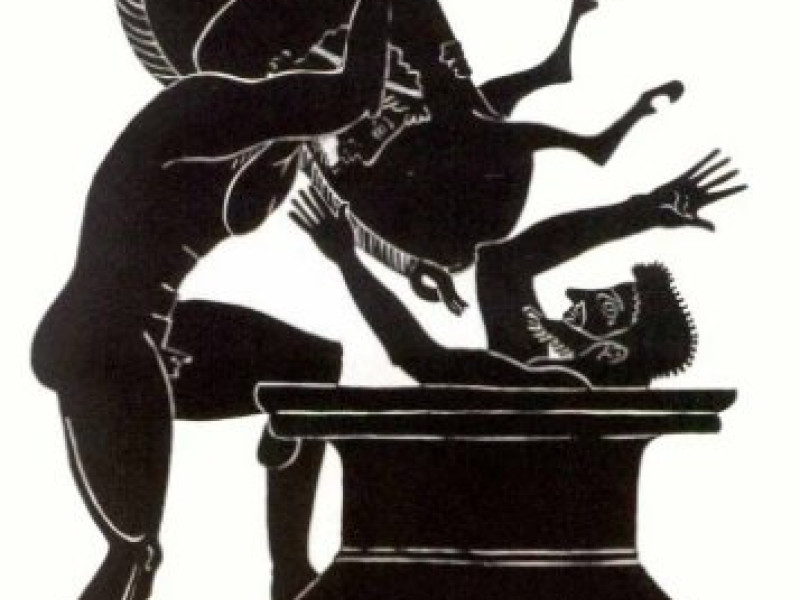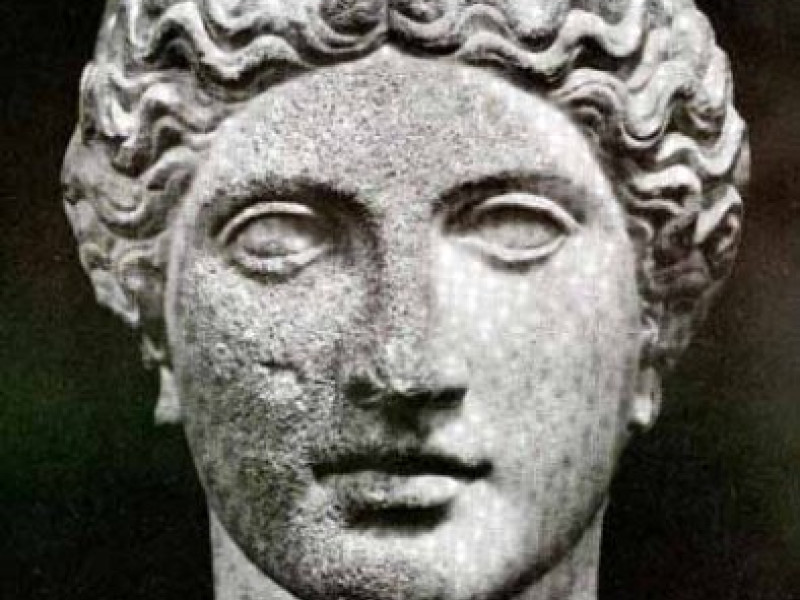Birth & Early Life
Birth of Heracles
Alcmene (Ἀλκμόνη) was the daughter of Electryon, king of Tiryns, and Anaxo. She married Amphitryon (Ἀμφιτρόων), son of Alcaeüs (Alcaeus).
According to the Shield of Heracles, Electryon's death was no accident; Amphitryon violently killed the king, because he was angry over some oxen.

Heracles and Iphicles
(Heracles strangling two
snakes in the crib)
Red figure pottery, 470 BC
Musée du Louvre, Paris
While Apollodorus says that Electryon's death was an accident. Taphians had raided the cattle from Electryon's pastures. Electryon's nine sons went to retrieve the stolen cows, but the sons of Electryon and the sons of Taphius killed one another in a battle. Electryon had gone on an expedition with Amphitryon to avenge his sons' death and recapture his cattle. Electryon had made Amphitryon promise not to have sex with his new wife until they returned from the expedition.
They had recovered the cattle from the Teleboans, when a bull had suddenly charged at the king and his newly married son-in-law, Amphitryon. Amphitryon had tried to defend himself, swinging his heavy club at the bull, but the weapon had rebounded off the horn, hitting the king in the head. According to Shield of Heracles, Hesiod says that it was no accident. Apparently Electryon and Amphitryon had an argument over some oxen.
Sthenelus took advantage of his brother's death, seizing power and exiling his nephew Amphitryon. Alcmene and her half-brother Licymnius fled with Amphitryon to Thebes.
At this time, Creon was king of Thebes, after the death of Laius. Creon purified Amphitryon for the killing the king and gave his daughter Perimede in marriage to Licymnius. According to Pausanias, Amphitryon and Alcmene lived near the Electran Gate, one of the seven gates of Thebes.
Alcmene remained faithful to her brothers' memory by refusing to lay with her husband until he avenged them against Taphian pirates. With Creon's aid, Amphitryon successfully led a campaign against the Taphians, but before his return, Zeus visited Alcmene in her husband's form and shared her bed.
Upon Amphitryon's return, he slept with Alcmene, but discovered that she was no longer a virgin. The Theban seer Teiresias cleared up the mystery - that she was visited by a god and not to blame for losing her virginity prematurely.
Nine months after Zeus' visit, Zeus boasted that a day had come where a child would be born with his lineage that would rule the land around him. The goddess Hera's implacable hatred for all of Zeus' children fathered with mortal women made him swear that it would be so.
No sooner Zeus had sworn this vow than Hera arranged with her daughter Eileithyia, goddess of childbirth, to delay the delivery of Alcmene. Eileithyia sat outside of the room where Alcmene was in labour. By sitting with her legs crossed and fingers intertwined, Eileithyia prevented Alcmene from pushing the babies out of her womb for seven agonizing days.
Hera saw to it that Sthenelus' son Eurystheus was born before Heracles. Eurystheus was born prematurely. Therefore, Eurystheus would be king of Mycenae and Tiryns. Zeus was furious with Hera but could not revoke his vow.
Alcmene might have died in childbirth had not an attendant Galanthis tricked Eileithyia into thinking that the child have been delivered, surprising the goddess who had been holding back the delivery. Galanthis paid a high price for loyalty to Alcmene when she tricked the goddess of childbirth. Eileithyia transformed Galanthis into a weasel. Alcmene bore twins, Heracles (Ἡρακλἣς) and Iphicles (Ἴφικλης); the second was a son of Alcmene by Amphitryon.
Alcaeüs was the name given to Heracles at birth (Heracles was named after his grandfather; Heracles didn't change his name until he went to Delphi for the first time).
According to Pausanias, the room that Alcmene gave birth to Heracles was called Alcmene's Chamber. His version about the hero's birth was slightly different from the usual account. Pausanias says that Hera had sent the Witches to delay or prevent Alcmene from giving birth, not Eileithyia. Also it was Historis, Teiresias' daughter, who tricked the Witches, not Alcmene's servant Galanthis.
Having failed to prevent the birth, the goddess sent two snakes to kill the infants in their crib. Iphicles screamed in terror, but Heracles strangled both snakes, one in each hand. Amphitryon realised that Iphicles was his child, but Heracles belonged to the god. Other writers say that Amphitryon himself sent the snakes to the infants' room to identify which child belonged to the god.
According to Diodorus Siculus, Alcmene, fearing Hera's wrath, abandoned her infant in the woods. Athena rescued the infant and brought the baby to Hera. Athena managed to persuade or dupe Hera into nursing the infant. Hera allowed the baby (Heracles) to suckle on one of her breasts, until the child bit very hard on her nipple. The goddess pushed the baby away from her nipple, spilling her milk across the heaven, forming the Milky Way. (So that was how this galaxy was created!)
The goddess told Athena to give the baby back to her mother to nurse. Athena returned child back to Alcmene, telling the mother to rear her own child. The irony of this situation is that Hera had actually saved her hated stepson's life by breast feeding him from her own breast.
Related Information
Name
Heracles, Herakles, Ἡρακλἣς – "Glory of Hera" (Greek).
Hercules (Roman).
Alcaeüs, Alcaeus, Ἀλκάεος (Greek; birth name).
Hercle (Etruscan)
Sources
Library was written by Apollodorus.
Metamorphoses was written by Ovid.
Iliad was written by Homer.
The Shield of Heracles was ascribed to Hesiod.
Heracles or Madness of Heracles were written by Euripides.
Library of History was written by Diodorus Siculus.
Nemean I, Nemean X and Pythian IX were written by Pindar.
Related Articles
Zeus, Hera, Alcmene, Amphitryon, Electryon, Eurystheus.
Genealogy
Genealogy: House of Perseus.
Early Life
At some point of his young life, his name was changed from Alcaeus to Heracles (Ἡρακλἣς), which means Glory of Hera. The name meant that he would obtain glory through Hera's enmity.
Many famous men were involved with his education. Amphitryon taught Heracles how to drive a chariot and Castor trained him in fencing, while the thief Autolycus, the son of Hermes, taught him how to wrestle. Another son of Hermes, Harpalycus of Phanotè, trained him in boxing. Eurytus, king of Oechalia, taught him archery. and Linus, son of the Muse Calliope or Urania, taught Heracles music. According to Theocritus, it was Eumolpus, son of Philammon, who taught the young hero play the lyre, as well as how to sing.
Teaching him music ended up in disaster when his teacher Linus struck the youth for his poor attention to music lessons. Heracles retaliated by striking him in the head with the lyre, killing Linus instantly. Heracles was acquitted of murder, but Amphitryon sent him to tend sheep on the farm in the countryside near Thespiae, to keep him out of trouble.
Here, at the foot of Mount Cithaeron, he killed a lion without a weapon that was killing flocks of Thespius, king of Thespiae. The king was so impressed by his feat that Thespius entertained the youth as his guest for fifty nights. Each night Thespius would send one of his fifty daughters to the hero's room. Other writers say that he slept with all the king's daughters in a single night. Only one of Thespius' daughters refused to sleep with Heracles. Two of the girls bore twins to Heracles, and Heracles had a total of fifty-one sons. After Heracles' death, these sons migrated to the island of Sardinia.
Related Information
Name
"Glory of Hera"
Heracles, Herakles; Alcaeüs, Alcaeus.
Hercules (Roman).
Sources
Library was written by Apollodorus.
Theogony was written by Hesiod.
The Shield of Heracles was possibly written by Hesiod.
Heracles or Madness of Heracles were written by Euripides.
Idylls was written by Theocritus.
Related Articles
Zeus, Hera, Alcmene, Amphitryon, Electryon, Eurystheus, Castor, Autolycus.
Genealogy
Genealogy: Perseids.
By Jimmy Joe






